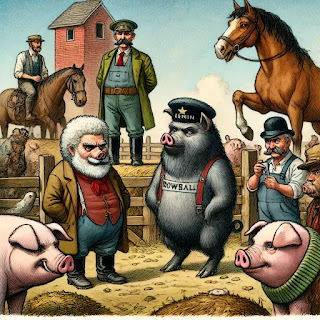"All animals are equal, but some are more equal than others.”
Checklist to Keep in Mind Before Attending George Orwell's 'Animal Farm':
Familiarize Yourself with George Orwell: Before attending the play, it's essential to have some background knowledge about the author, George Orwell. Learn about his life, political beliefs, and other notable works to gain a deeper understanding of his perspective.
Read the Book: Reading the original novel, 'Animal Farm,' is highly recommended. It provides a comprehensive and nuanced understanding of the story, its themes, and the political allegory it represents. This will enhance your experience and help you appreciate the adaptation.
Research the Historical Context: 'Animal Farm' is a political allegory that satirizes the events leading up to the Russian Revolution and the subsequent Stalinist era. Educate yourself about the historical context, including key figures, ideologies, and events, such as the Russian Revolution, Lenin, Trotsky, and Stalin.
Genre: Satirical allegory or allegorical fable/ novel which
bluntly criticizes the Russian Dictatorship and Totalitarian concept of 1930’s
of Stalin era. It is a condemnation of totalitarian society based on the
Russian Revolutions of 1917 and their betrayal by Stalin.
Time and Publication: Published in England
on 17 August 1945 during
the Great War II
The place: Manor Farm
Interesting Point: Conflicting policies between
Snowball and Napoleon
Symbolic Characters:
Napoleon( the pig): It stands for Stalin, the dictator
and tyrant. As in the novel Snawball is ousted and declared traitor by
Napoleon, Stalin also declared Trotsky, the rival communist as traitor and
expelled him from Russia
by his Red Army.
In the novel we find Napoleon gradually cementing his
position without paying any heed to the rules of Animal world, and establish
relationship with human beings. Napoleon as the head of the Animal Farm totally
forgets the doctrines of Revolution and becomes tyrant by the way of his rules.
The Napoleon in Animal Farm truly parallels to Stalin in 1930’s. Stalin also
establishes links with Fascism and Capitalism. His several meetings with
Churchill after the World War II are the clear sign of it.
Snowball( the pig): Napoleon's rival representing Trotsky and Lenin.
Mr Jones the farmer:a heavy drunkard who does not take care of the farm and thus the animals revolted.
Old Major( the pig) :The Inspired character who alights the rebellion in the farm. He is the emblem of Karl Marks and Lenin, the origin of Marxism.
Mr. Frederick: Owner of the next farm associates with Napoleon, the pig.
Boxer: A hardworking, respectable horse.
Understand the Allegorical Elements: 'Animal Farm' uses animals to symbolize political figures and concepts. Each animal represents a different character or group in the historical narrative. Research and familiarize yourself with these allegorical representations to fully grasp the play's intended meaning.
The Story: The animals, dissatisfied with their
servitude to humans, take over their farm intending to run things fairly. The
novel begins as the animals of Manor Farm unite against farmer Jones to
overthrow his tyrannical rule. However,
they are betrayed by the pigs who adopt the commandment “All animals are equal,
but some animals are more equal than others.” The tone is ultimately one of
pessimism, suggesting that all revolutions will fail to realize their original
ideals because there will always be someone to help the “pigs” gain their evil
ends.
Intention: Orwell undoubtedly passes judgment on the
fate of revolution by comparing ideological promises with their practical
application.
In Essence: Orwell does not condemn
revolution but agonizes over the betrayal of its ideals.
Analyze the Themes: 'Animal Farm' explores themes of power, corruption, inequality, and the dangers of totalitarianism. Reflect on these themes and consider how they relate to contemporary society or historical events. This will help you engage with the play on a deeper level and provoke thoughtful discussions.
Study the Characters: The characters in 'Animal Farm' have specific traits and represent different facets of society and politics. Pay attention to their motivations, actions, and relationships. Understanding their roles and significance will enrich your experience and enable you to appreciate the complexities of the story.
Familiarize Yourself with the Satirical Elements: 'Animal Farm' employs satire to criticize and expose societal flaws and political systems. Be prepared to interpret and appreciate the satirical aspects of the play, including irony, sarcasm, and humor.
Consider Historical Relevance: While 'Animal Farm' is rooted in a specific historical period, its themes and messages have enduring relevance. Reflect on how the play's ideas relate to contemporary society, politics, and power dynamics. This will enable you to appreciate the play's relevance beyond its historical context.
Engage in Discussions: 'Animal Farm' raises thought-provoking questions and themes that encourage dialogue. Participate in discussions with fellow attendees, or if attending a performance as part of a school or university, engage in post-show discussions with classmates and instructors. Sharing perspectives and insights can deepen your understanding and offer different viewpoints.
Approach with an Open Mind: Lastly, approach the play with an open mind and willingness to explore complex ideas. 'Animal Farm' challenges conventional thinking and provides a critique of power structures. Allow yourself to be immersed in the story, reflect on its implications, and draw your own conclusions.
By keeping these points in mind, you'll be better prepared to fully appreciate and engage with George Orwell's 'Animal Farm' adaptation. Enjoy the performance!
Ref: 1> Animal Farm - Wikipedia. (2011, December 7). Animal Farm - Wikipedia. http://en.wikipedia.org/wiki/Animal_Farm
2> ANIMAL FARM - ENGLISH - GEORGE ORWELL : GEORGE ORWELL : Free Download, Borrow, and Streaming : Internet Archive. (n.d.). Internet Archive. https://archive.org/details/AnimalFarm-English-GeorgeOrwell



Comments
Post a Comment
Drop any query, suggestion or comment here.